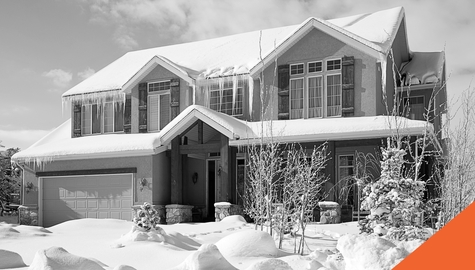What to Do if a Tree Falls on Your House: Insurance Guide
Monday, 15 January 2024
Owning a home or living in a neighbourhood that has a nice mix of trees surrounding it are situations many Canadians find themselves in. Aside from being great for the environment, trees provide added benefits to property owners, such as privacy in their yards and shade on sunny days. They can even contribute to the look and feel of a home and add to its curb appeal.
That said, some concerns come with this as well. For example, if a tree falls on your house, does insurance cover the damage? Whether it’s due to a powerful storm, decay, or other unforeseen circumstances, a fallen tree can cause significant destruction to your home. In times like these, home insurance is crucial to mitigating the financial burdens of tending to any damage.
This blog will highlight whether a tree falling on a house is covered by your insurance, guide you through the process of filing a claim with your provider, and answer frequently asked questions about tree damage and home insurance.
Does Insurance Cover a Tree Falling on a House?
Depending on the situation, if a tree falls on your house, insurance coverage will protect you. This section will cover the different types of coverage home insurance policies possess and discuss important things to remember, such as the cause of the tree falling, damage assessment, and policy exclusions.
Coverage Type
With respect to home insurance, there are three main ways that your policy can protect you from tree damage. This includes coverage for the dwelling, personal property, and additional living expenses (ALE).
Dwelling coverage refers to the core component of your insurance and typically covers the structure of your home, including the walls, roofs, floors, built-in appliances, and other man components. If a tree falls on your house, insurance coverage may help repair or rebuild your home.
Personal property coverage is another important aspect of home insurance. If any of your belongings are damaged from a tree falling on your house, insurance will help pay for repairing or replacing items such as furniture, electronics, and clothing.
If damage from the fallen tree makes your home uninhabitable, coverage for additional living expenses will help with the cost of temporary living arrangements. This can include hotel bills, restaurant bills, laundry fees, etc., while your home is being worked on.
It is important to note that your home insurance policy is unique to you and your situation. Reviewing your policy details will give you a better understanding of coverage limits, deductibles, and exclusions and ensure you have adequate protection in the event of a tree-related incident.
Cause of Tree Fall
There are many reasons why a tree could fall on your property or home. Before confirming if you are covered, your insurance company will need to know what caused the incident.
Insurance is more likely to cover the damage if a healthy, living tree falls on your house. The sudden collapse of a healthy tree is viewed as a sudden and unforeseen peril that you, as a homeowner, could not have predicted or prevented. Insurance policies typically include coverage for these damages.
Will insurance cover a dead tree falling on your house? This is a situation that insurance companies may view differently when compared to a healthy tree. If you were aware of the tree's condition and failed to address the potential hazard before it fell, you could be found negligent by your insurance provider. This would likely lead to your claim being denied.
Damage from a fallen tree resulting from a natural disaster, such as a hurricane or tornado, might be subject to different rules and coverage limitations. Some policies may have specific provisions for natural disasters, while others require additional coverage. It’s best to review your policy or contact your BIG broker to confirm if this is included in your policy.
Sometimes, a fallen tree results from your intentional acts, such as cutting it down. If you are not careful with this process and accidentally cut down the tree in a way that makes it fall on your house, you may not be covered. In most cases, insurance policies exclude damage from intentional acts.
Damage Assessment
While a tree falling can be a stressful experience, sometimes the damage is only minor and does not require significant repairs. In such cases, weighing the cost-effectiveness of filing a claim becomes essential. If the repair costs are close to or below the deductible, it may be more practical to address the expenses independently rather than filing a claim that won't significantly offset the financial burden.
Policy Exclusions
Taking a proactive approach to understanding any policy exclusions is a crucial step you should take to handle a fallen tree. As previously mentioned, instances of neglect, intentional acts, or damage caused by certain natural disasters could all be excluded from your policy. Coverage may be limited or denied if the fallen tree incident falls within these excluded categories. Being aware of these exclusions empowers homeowners to address potential coverage gaps and explore additional insurance options if needed.
How to File a Claim for Tree Damage
If a tree falls on your house, follow this step-by-step guide to file a claim so that you can have the situation rectified as quickly as possible.
Contact Your Insurance Company
When a tree falls on your property, contact your insurance brokerage immediately. Provide them with essential details about the incident, such as the date, time, location, insurance company, and policy number. This initial step triggers the claims process and ensures that you receive timely guidance on the next steps.
Document the Damage
Thoroughly document the damage inflicted by the fallen tree. Take clear photographs and videos of the affected areas, capturing the extent of structural damage, damage to personal property, and any visible details.
Check Your Policy Coverage
Review your homeowner's insurance policy to understand the coverage applicable to tree-related incidents. Take note of coverage limits, deductibles, and any exclusions that might impact the claim. This ensures you have a clear understanding of what your policy will cover.
Get Repair Estimates
Obtain repair estimates from reputable contractors. These estimates help assess the overall cost of repairs and guide your decision-making during the claims process. Consult with multiple professionals to ensure accuracy in estimating the necessary repairs.
Await Claim Resolution
Once you've filed the claim and submitted all required documentation, patiently wait for the claim to be resolved. Insurance adjusters will assess the information provided and determine the applicable coverage. Maintain regular communication with your insurance company for updates on the claim's progress.
Tree Falling on a House: Insurance FAQs
What if a neighbour’s tree falls on my house?
Your insurance covers the repairs if a neighbour's tree damages your house. You should file a claim with your insurance, but legal action might also be necessary if your neighbour’s tree fell due to their negligence.
Does tree health affect coverage?
You have a better chance of being covered for a healthy tree falling on your house due to unforeseen events. If the tree is visibly diseased or dead, coverage may be denied as you likely would have been aware of the risk and failed to address the hazard.
What if the tree doesn't damage anything?
Home insurance is designed to help you when the unexpected occurs and causes damage to your property. Home insurance is not applicable when a tree falls, but nothing is damaged.
Does homeowners insurance cover the removal of tree debris?
This varies by case. If the debris is from a tree that fell and did not cause any damage, you would be on the hook for removing it. When debris from a tree damages your home or blocks a driveway in your neighbourhood, home insurance may help with removing it.
Insurance Made Easy with BIG
Tree-related incidents involving your home can be challenging and stressful. However, by proactively addressing any trees that pose potential risks to your house, understanding what is included within your policy, and promptly filing a claim with your provider, you will be well-positioned to receive the proper help and coverage you need. To learn more about the home insurance options available to you, contact a BIG broker or request a quote online today.



